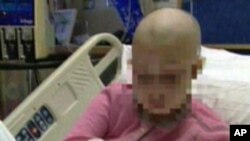A childhood cancer foundation based in the U.S. estimates that 160,000 children around the world are diagnosed each year with cancer. The odds of survival are better in developed countries than elsewhere. But a large scale study of patients in North America who are living into adulthood shows that many are not getting the follow-up medical exams they need.
As a child with leukemia, Kelly Krauel was told incorrectly the chemotherapy and radiation she endured would prevent her from having a family of her own. That was just the beginning of what lay ahead as she grew older.
"I was diagnosed with skin cancer, thyroid cancer, breast cancer," Cancer survivor Kelly Krauel, explains.
Now scientists believe the toxic chemicals that helped fight the cancer more than two decades ago may have contributed to a higher risk of health problems later on.
The Childhood Cancer Survivor Study began in 1993 to study medical treatment of children diagnosed with cancer between 1970 and 1986. According to the National Cancer Institute, the late effects of chemotherapy, radiation and other cancer medicine from that period now range from premature menopause, and stroke to secondary cancers.
Kelly Krauel is now screened for cancer on a regular basis.
But as many as 90 percent of the cancer survivors in the study had not had a routine colonoscopy, 75 percent had never had a skin cancer examination and 50 percent of women had not had a mammogram.
Cancers of the colon, rectum, breast and skin have been linked to the amount of radiation treatment given to children in this period.
Dr. Aziza Shad of Georgetown University's Lombardi Cancer Center says follow-up exams can be critical. "Maybe you can't alter the course of what is going to happen, but you can make it more bearable: early detection, prevention and care," he said.
The researchers stress the importance of a continuing relationship with a doctor after the young cancer survivor reaches adulthood.
Matthew Grossman was first diagnosed with a brain tumor four years ago. He is free of cancer for now, but is diligent about checkups. "It's really an ongoing battle that never really ends," Matthew said.
The coordinators of the National Cancer Institute study say cancer treatment for children has improved greatly in the last two decades.
The scientists are hoping that evaluations of children treated in this later period will provide a more optimistic prognosis.




